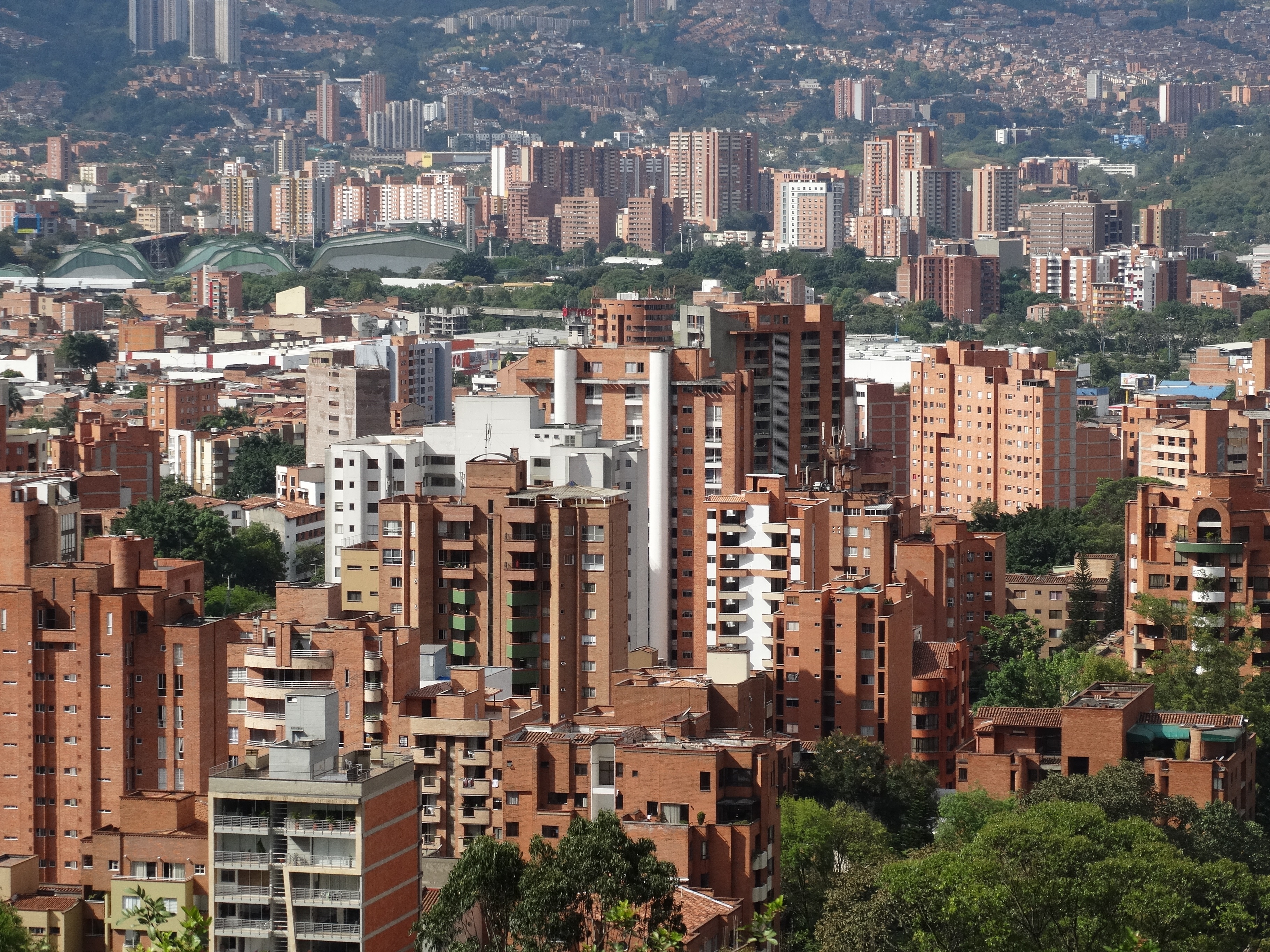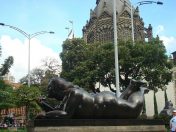30 Medellin Spanish Slang Expressions I Learned From Paisas

Get our free email course, Shortcut to Conversational.
Have conversations faster, understand people when they speak fast, and other tested tips to learn faster.
More infoIf you are a foreigner who is thinking about living in Medellin or even visiting for a short stay, then one of the first things you should do is try to familiarize yourself with some local slang and expressions.
Luckily for you, we have gathered the 30 most common Medellin slang expressions to help you sound like a true paisa, in case you decide to visit the City of Eternal Spring.
Each expression comes with audio (recording from a local paisa) to make sure that you can make sure your pronunciation is correct.
(PS, we listed the most common 83 Medellin Spanish slang words here)
1) ¿Qué más? ¿Bien ó no?
A common way for paisas to greet each other. Similar to “what’s new, are you well?”.
(paisa/s = the name of people from Antioquia, the state where Medellin is)
- ¿Qué más parce? ¿Bien ó no? – What’s new man? All good?
2) Bien fría
The way you always want your beer, bien fría (very cold or frosty).
- Me puedes traer dos polas bien frías por favor – Can you bring me two cold beers, please
3) Bien rico
In most Spanish speaking cities, this expression is used when you are about to finish eating food that was very good, or super tasty. For Paisas, bien rico can be used when *anything* is good.
- La rumba estuvo bien rica – The party was good
4) ¿Quiubo? or ¿Q’ubo?
Another popular greeting, which is a short way of asking Qué hubo? (“What’s up?”)
- ¿Quiubo parce? ¿Cómo ha estado todo? – What’s up, dude? How is everything?
5) Caído del zarzo
An expression that’s used when someone does something stupid, or lacks common sense.
- Rafael no agarra la pista, a veces es demasiado caído del zarzo – Rafael doesn’t get the clue, sometimes he lacks common sense
6) Darse al dolor
When something happens to a person that makes them sad and as a result, they don’t feel like doing anything, Paisas would say that person “se dio al dolor”, which is similar to being “down in the dumps”.
- Desde que lo despidieron se dio al dolor y no tiene ánimos de nada – He has been down in the dumps ever since he was fired, and has no intention of doing anything
7) Del putas
Before you jump to conclusions, this Medellin Spanish expression has no connection with the word puta (prostitute). Instead, it’s used to refer to something cool, similar to “the shit” in English.
- Mi curso de español en BaseLang es del putas – My BaseLang Spanish course is the shit
8) Echar los perros
Slang expression meaning to flirt with someone.
- Esa mujer me está echando los perros – That woman was flirting with me
9) En bombas
You should really get yourself to Medellin en bombas ie. ASAP or quickly.
- Fui a mi casa pero volví en bombas – I went home, but I came back quickly
10) De una
When a Paisa asks if you want to learn some Medellin Spanish slang, you can respond with de una, which is a phrase used to affirm that you’ll do something immediately or right now. Similar to “let’s go”.
- ¿Puedes ayudarme con mi tarea? ¡Sí claro, de una! – Can you help me with my homework? Yes, of course, let’s go!
11) ¡Eh, Ave María Pues!
One of the most popular Medellin Spanish expressions, which is similar to “oh my god”, but instead, calling Mother Mary’s name. Just like the English equivalent, it can be used to express happiness, sadness, or any expression of amazement.
- ¡Eh, Ave María Pues! Mira que grande está el bebé – OMG! look how big the baby is
12) Foquiado
Being in a deep sleep, or out for the count.
- Lamento no haber salido con ustedes, pero el viernes me quedé foquiado – I’m sorry I didn’t go out with you, but on Friday I fell sound asleep
13) Hacer vaca
An expression for collecting money in order to buy something.
- Hagamos vaca para la despedida de Mateo – We all should chip in for Mateo’s Birthday
14) Hacer la vuelta
A common Medellin Spanish slang expression, used when you need someone to do you a favor: ¡Haz la vuelta!
- Necesito que me hagas la vuelta de buscar algo en el mercado – I need you to do me a favor to look for something in the market
15) Hágale pues
Probably the number one expression associated to Medellin Spanish. It’s similar to “ok, do it”, “go for it” or even “go ahead”, and is used to confirm and close a conversation with an affirmative tone of what has just been said.
(sidenote: In Medellin, pues tends to appear in almost every sentence, and while it depends on the context, in general, it doesn’t mean anything. It can be used at the start of a sentence, similar to “ehhh” in English)
- Voy a llevarle esto a mi abuela, y ya regreso – ¡Hágale pues! – I’m going to take this to my grandmother, and I’m back – Ok. Go for it!
16) Estar buena/o
When I first arrived in Medellin and my Spanish was terrible, I told a local “estàs buena”, which to my horror didn’t mean “All good?”. Instead, it meant “you are hot” – cue awkward moment.
- Esa vieja está buena – That women is hot
17) En la juega
Directly translates to “in the game”, but means to be ready, or to stay alert
- Hey parce, en la juega que ya viene alguien – Dude, watch out! someone’s coming
18) Es un nea
You don’t want to hang around with a nea, since it’s normally someone who causes trouble, or can’t be trusted.
- Ese man es un nea, aléjate de él – That man is trouble, get away from him
19) Mamar gallo
Although this translates to “sucking a rooster”, in Medellin Spanish slang it can be used to describe lying, kidding, or winding somebody up.
- ¿Esa historia que me contó es verdad o me está mamando gallo? – Is that story he told me the truth, or is he lying to me?
20) Nanay cucas
To flat out deny or say no to something.
- Parce deme un poquito de lo que está comiendo. Oigan a este, nanay cucas – Can I grab a bite of what you’re having? Listen to this, No way!
21) No te perdas tanto
Your new Paisa friends may tell you this. While it directly translates as “don’t get lost”, it is similar to the expression “don’t be a stranger” in English.
- No te perdas tanto, sigamos en contacto – Don’t be a stranger, let’s keep in touch
22) ¡Qué berraquera!
When something surprises you because of how good it is, then this is the phrase you are looking for.
- ¡Qué berraquera ese juego de fútbol. Todos estaban felices – How good that soccer game. Everyone was happy
23) ¡Parce, qué chimba!
Another Medellin Spanish expression for something that is very cool or good.
- Parce, ¡qué chimba esa fiesta de cumpleaños! – Dude, what a good birthday party
24) Ábrase
Basically, to tell someone “fuck off” (careful with this one).
- Parce, no lo queremos aquí. ¡Ábrase! – Dude, we don’t want you here. Fuck off!
25) Borrar el cassette
Translates to “delete the cassette” and is used to express forgetting something.
- Se me borró el cassette y olvide comprar lo que me pediste – I forgot to buy what you asked for
I’m told that this expression also means to blackout from alcohol, but (cough) that never happened to me, so I wouldn’t know for sure.
- Tomé demasiado aguardiente anoche y borré cassette – I drank too much aguardiente last night and I blacked out
26) Chicharrón
You may already know that chicharron is fried pork skin. However, Paisas use this word to express that something is complicated and has yet to be solved.
- Tengo un chicharrón en el trabajo que no me dejará irme temprano – I have something to solve at work that will not let me leave early
27) Estar amañado/amañarse
When you’ve stayed long enough in Medellin and it’s starting to feel like home, you are officially amañado – i.e you are settled.
- Llevo 2 años en Medellín y estoy muy amañado – I’ve been in Medellin for 2 years and I’m very settled
28) Estar mamado/a
When you’re absolutely exhausted.
- Hoy no quiero salir de la casa, estoy muy mamado – I don’t want to go out today, I’m exhausted
29) No dar papaya
We couldn’t wrap this post up without mentioning an expression that is a paisa favorite It translates as “don’t give papaya” (the fruit) but is used as a warning or perhaps to tell someone: don’t put yourself in a vulnerable position where you may be taken advantage of.
- Parcero, ¡no des papaya! – Bro, keep your wits about you!
30) ¿Quién pidió pollo?
If you Google Translate this one, you’ll get “who ordered chicken?”. However, it’s actually a Medellin Spanish expression, used to say that somebody is good looking – whether you use it to flirt with them, or you’re hanging out with friends and somebody attractive walks by.
- Parceros ¿Quién pidió pollo? – Guys, look at this beautiful girl


